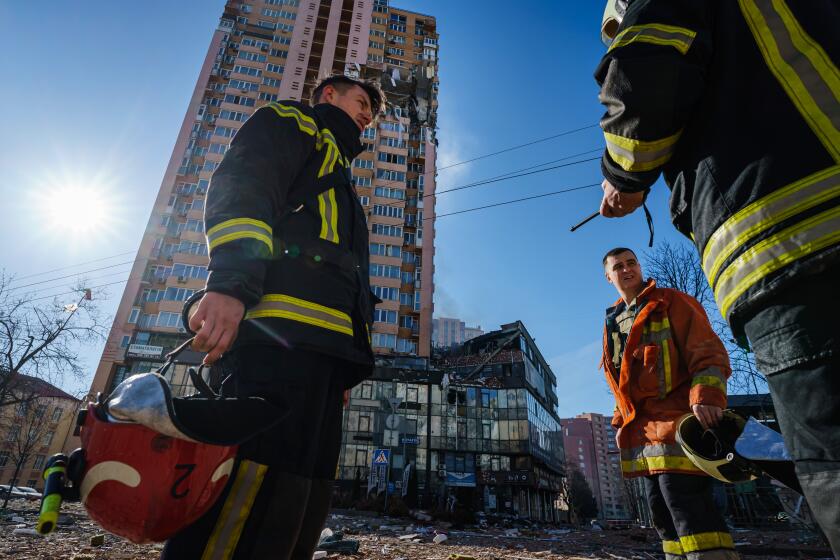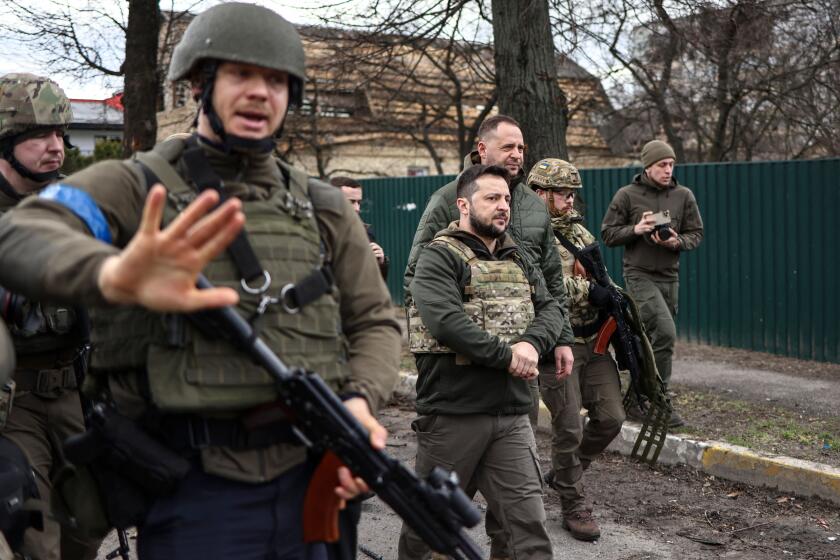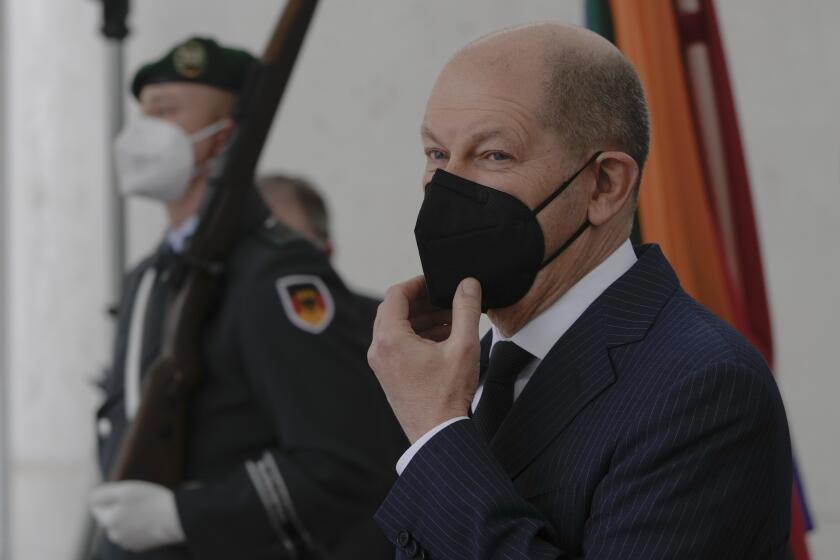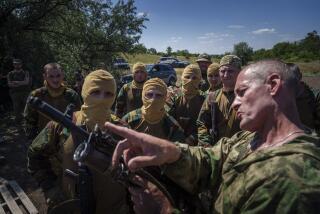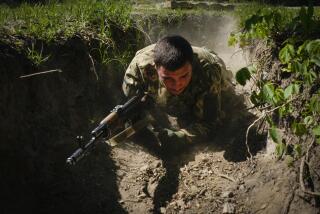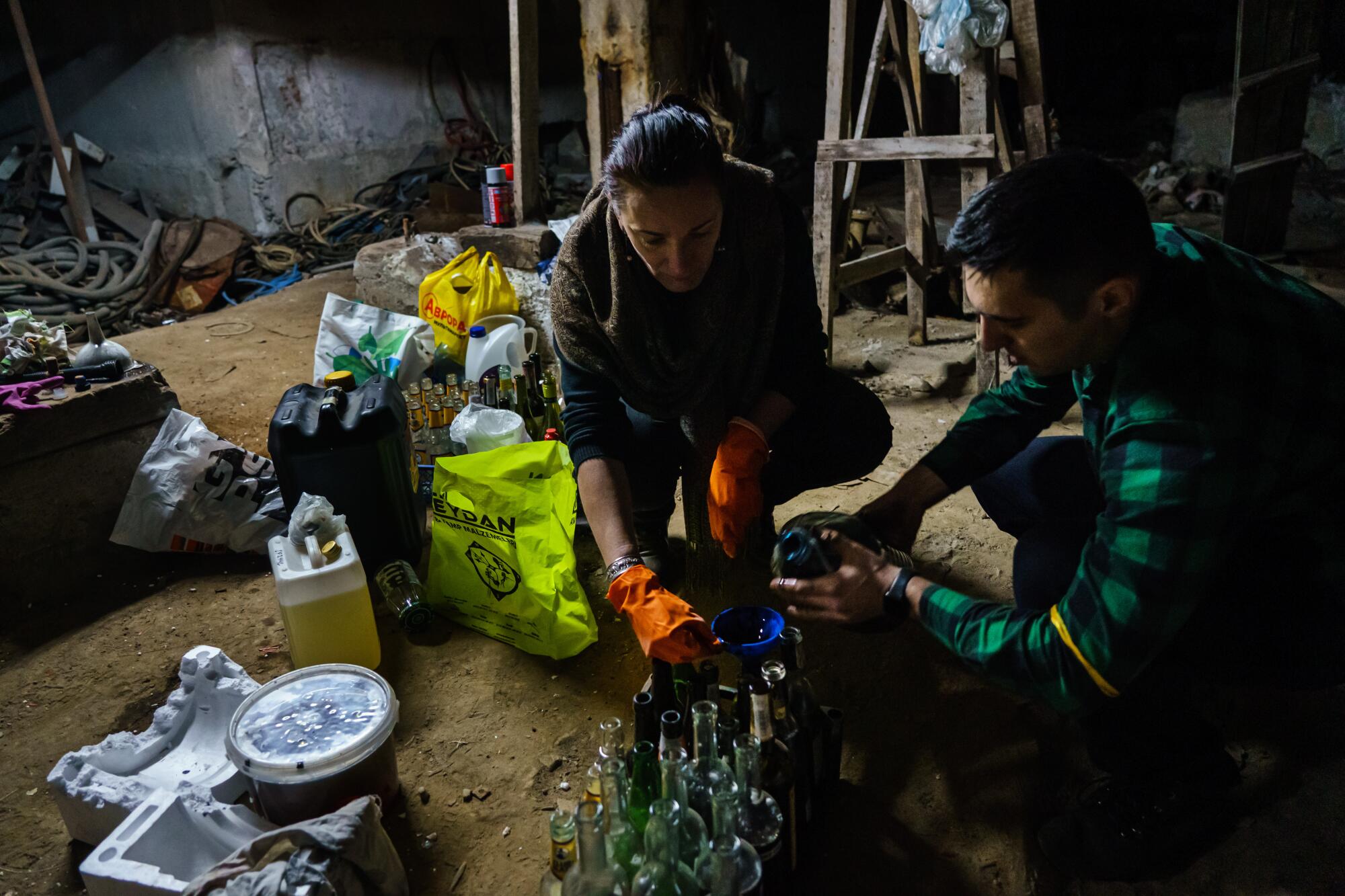
- Share via
KYIV, Ukraine — In a basement three stories underground, on a quiet, unassuming street in Ukraine’s capital, Olga, 24, crumbled chunks of Styrofoam on Saturday, coaxing the white pebbles from her hand into bottles of sangria mix, Beefeater gin, and beer and wine laid out in front of her.
Olga, a project manager at a graphics firm who asked that her full name not be published to protect her security, was a cog in a five-person Molotov cocktail assembly team. As she and a second woman crushed the Styrofoam, a man and woman to their side carefully poured fuel and oil into a funnel, oozing the mix into the bottles. Next to them, a man dipped the wicks — shredded pieces of tablecloths and curtains — before wrapping the heads with bits of twine.
“I left my old job two weeks ago, and was supposed to start the new one on Monday,” said Olga. “I never imagined I’d be doing this instead.
“I prefer my new job to this, really. But it’s important.”
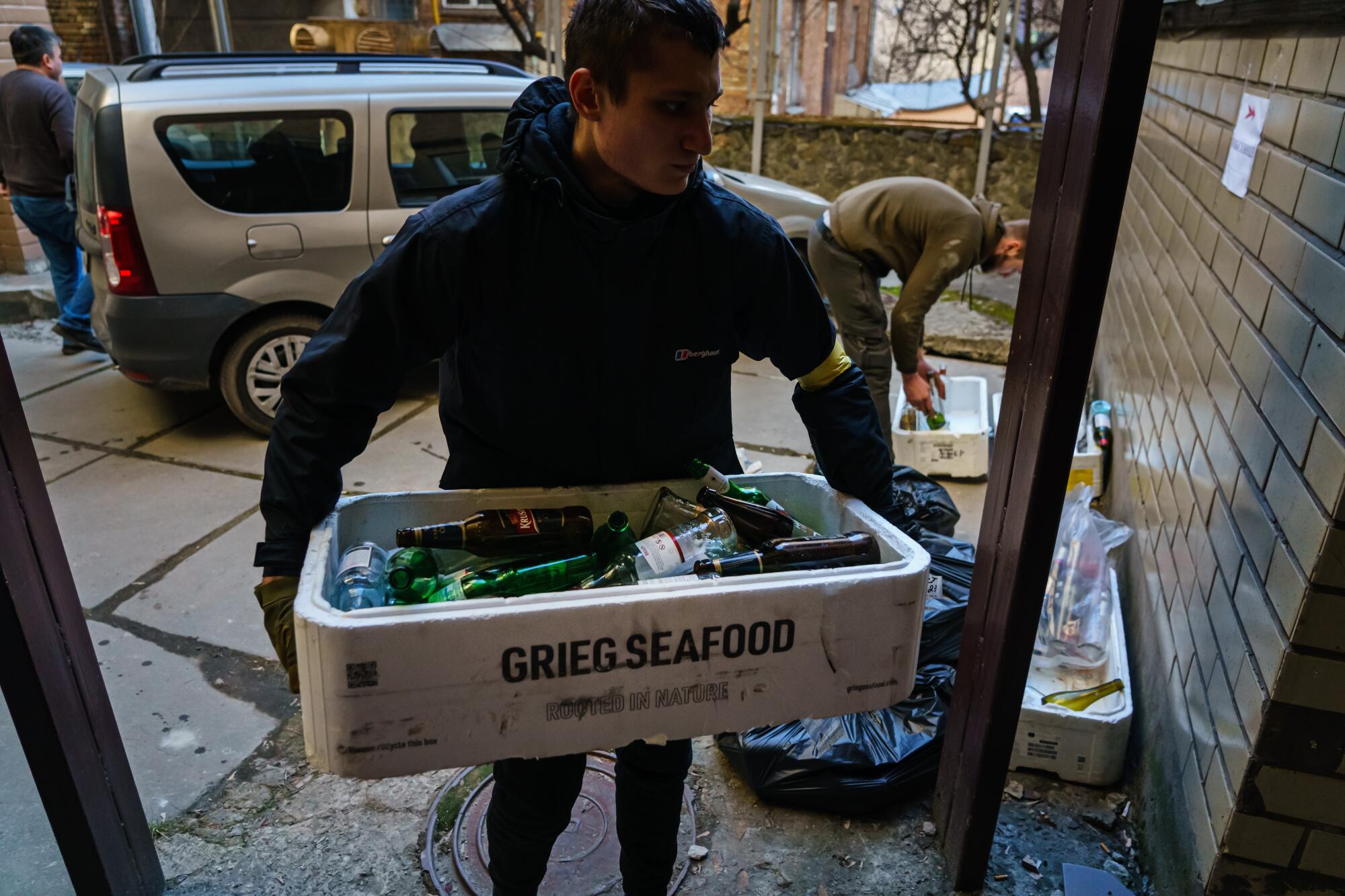
There were other teams in the building too. One floor above, an older couple sorted through boxes of bottles near a behemoth-sized boiler. Another group of serious-looking men — and boys with the first, sparse tufts of facial hair and the let’s-appear-serious look of the teenagers they are — sat in a hall on the ground level near stacks of shiny, black Kalashnikovs, ammunition pouches and plastic pails of soup.
Ukrainian forces and armed volunteers fought fiercely to maintain control of Kyiv against Russian troops as explosions and gunfire shook the city.
The burst of lethal activity on what normally would have been a lazy Saturday was part of a citywide mobilization in this tense capital, turning many of its nearly 3 million residents into a semi-organized resistance against Russian invaders.
Since Russian ground and air forces launched their assault last week, the Ukrainian National Guard has tallied 198 deaths. Three of the victims of the Russian blitz have been children. An additional 1,115 people have been wounded, including 33 children.
Multiple formations of Russian troops are now assembled at the capital’s outskirts. In the third day of Russia’s invasion, skirmishes with the invading force broke out in outlying neighborhoods and a missile gouged out six apartments from a residential tower in a central neighborhood.
A woman reacts as she stands in front of a house burning after being shelled in the city of Irpin.
At night, the now familiar sound of air-raid sirens blared in mostly empty streets, their only interruption a rhythm section composed of machine guns and antiaircraft cannons.
To face the Russians, Ukrainian authorities have already supplied reservists — anyone with a passport and a willingness to fight — with more than 18,000 guns. On Saturday, hundreds of men queued up in the cold in front of a stadium, many brandishing machine guns of different types.
Authorities have issued an order for men between the ages of 18 and 60 to not leave the country.
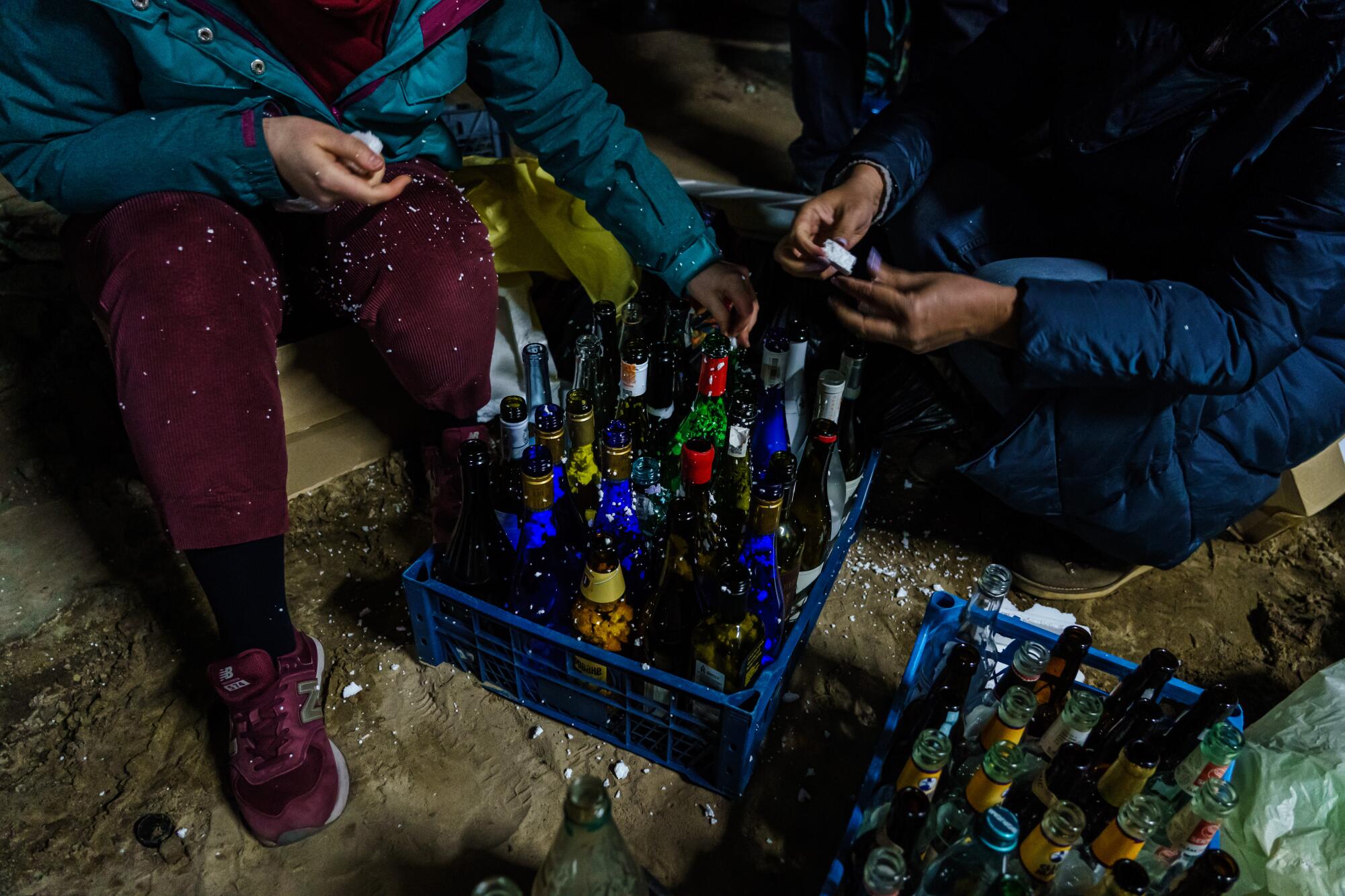
At the makeshift Molotov factory, Omelanenko, 41, barely took her eyes off her smartphone screen as she scrolled through the call history list.
“In the last two days we’ve got more than 400 people,” she said. “I have a phone call every minute from people who donate or who want to join.
“Many people give money to help us out.”
With the Ukrainian army outnumbered and outgunned, authorities have exhorted citizens to employ unorthodox tactics to help impede the Russian advance.
President Biden and European allies said they would impose sanctions on Russia’s central bank in response to Russia’s unprovoked war against Ukraine.
The spike in Molotov cocktail production came one day after the Ukrainian Defense Ministry tweeted to “make Molotov cocktails and take down the occupier” and a TV channel broadcast instructions on how to do so.
On Saturday, the Defense Ministry issued a tough-love-toned list of other ways citizens could help. “Block roads, cut down trees, stretch nets from gates, whatever way suits you.” Excavator owners were urged to dig so the enemy couldn’t pass.
One directive said: “If you know the enemy stopped in the forest, and you are 100% sure that it is the enemy, do not pity the forest, set it on fire … a new one will grow on the bones of the occupier!!!!”
While each action might have limited impact, taken together they could prove a powerful game-changer on the battlefield, said John Spencer, chair of Urban Warfare Studies at West Point’s Modern War Institute.
“In the urban terrain it doesn’t matter how powerful a military you are.… Any untrained individual can turn it into hell for the most trained individual,” he said, adding that army doctrine dictates you need five attackers for each defender in a setting like Kyiv.
“When the whole population rises up, trapping soldiers, putting up barriers, cutting off soldiers from their support, it becomes a trap.
“And I like the ‘Home Alone’ analogy: He protects himself, but lays out traps,” he said, referring to the 1990 movie about a boy left alone at home who fends off burglars.
Spencer mentioned Iraq, where civilians heaped trash or put up makeshift barriers forcing American-led coalition tanks to slow down and maneuver around them, making them easier to pick off. Not to mention that hard concrete buildings, especially tall ones with balustrade-edged balconies, offer a natural defense as well as a high vantage point — ideal for dropping Molotov cocktails that could disable even a tank.
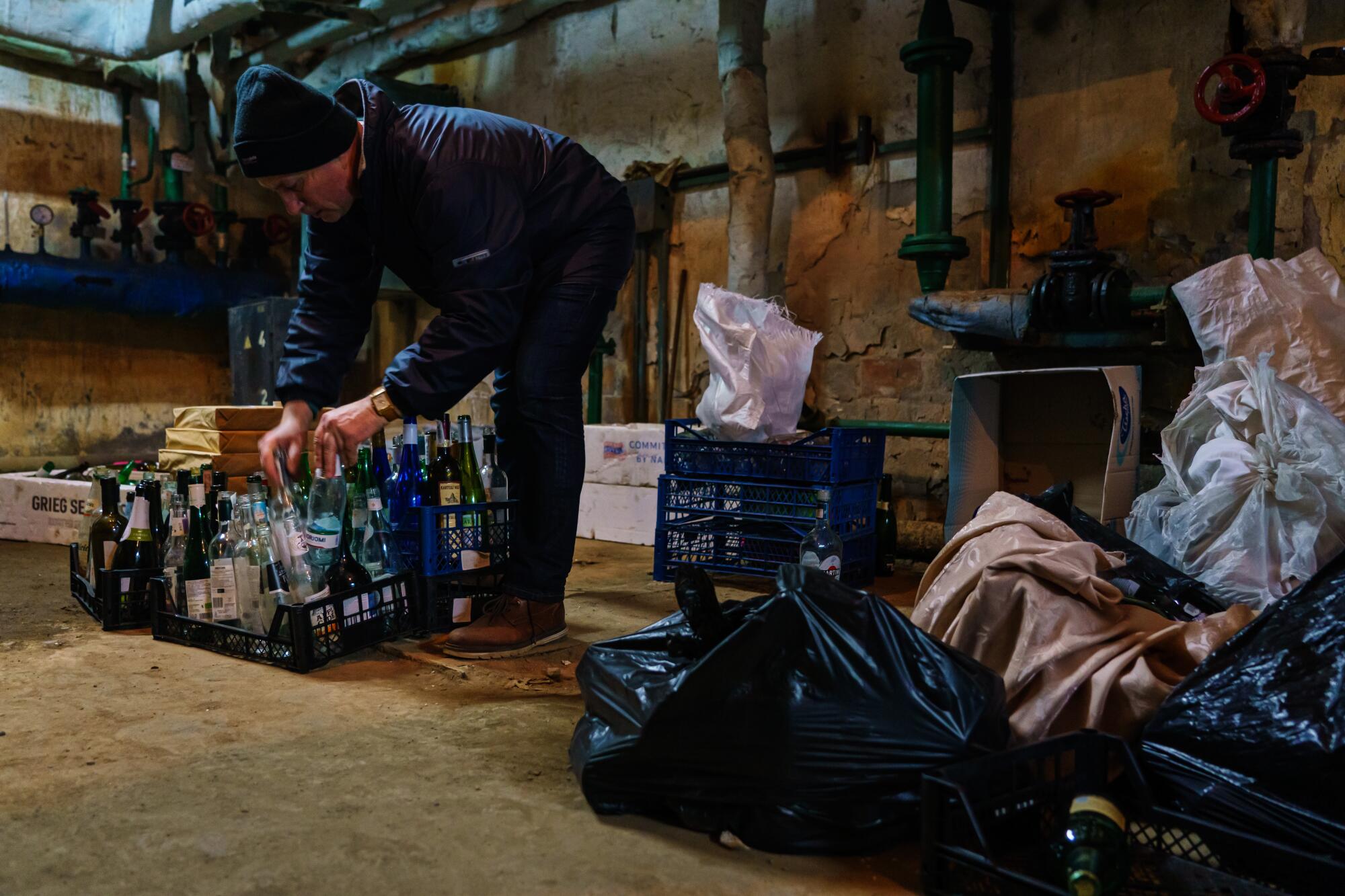
On Saturday, Spencer tweeted out a list of tactics that could help what appear to be the fledgling steps of an anti-Russian insurgency.
“I don’t want civilians to die, but this is a fight for existence,” he said. “If you want to resist, be smart about it.”
Ukrainians have already utilized psy-ops elements: In the capital, residents have removed road signs to disorient Russian soldiers unfamiliar with Kyiv’s streets. A video uploaded on social media Friday showed a Ukrainian man standing before a tank column in a moment reminiscent of Tiananmen Square in Beijing in 1989. Ukrainian authorities set up a hotline for Russian family members to call and inquire about their soldier sons and learn if they were captured or killed.
With fears growing of saboteurs already infiltrating the city, a sense of hypervigilance has descended on Kyiv. On Saturday, police spirited two men away from the damaged apartment tower. “They were Russians doing evil things — as usual,” said one paramedic as she watched them go toward a waiting police car.
That sense of suspicion spurred Kyiv’s mayor to order a curfew beginning Saturday evening and due to last until Monday morning.
“We remind you that all civilians who will be on the street during the curfew will be considered as members of the enemy’s sabotage and reconnaissance groups,” said the injunction.
The situation didn’t seem to faze Alexander Dovhan, 49, a taciturn engineer who was sorting bottles for Molotov cocktails.
“These bottles are ‘Good morning’ to Putin,” he said.
But then his face turned serious.
“I want to do this because everyone wanted peace and good relations, but it’s war,” he said. “It’s important we’re here.”
More to Read
Sign up for Essential California
The most important California stories and recommendations in your inbox every morning.
You may occasionally receive promotional content from the Los Angeles Times.
